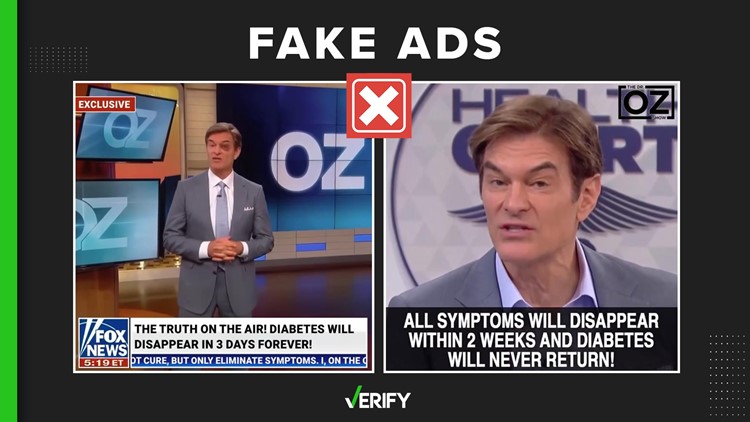In November, multiple ads on Facebook claimed Dr. Mehmet Oz, a physician and former host of “The Dr. Oz Show,” was promoting a miracle cure for diabetes that can treat the condition in as little as three days to two weeks. One of the ads also features Wolf Blitzer, host of CNN’s “The Situation Room,” while FOX News host Sean Hannity appears in another iteration of the ad.
Diabetes is a chronic health condition that affects how your body turns food into energy, according to the U.S. Centers for Disease Control and Prevention (CDC). More than 38 million people in the U.S. have diabetes, and almost one in four adults don’t know they have it, the CDC says.
Since the ads have gone viral, multiple VERIFY readers, including Deb and Elaine, have reached out to us asking if Dr. Oz is actually promoting a diabetes cure in ads on Facebook.
THE QUESTION
Is Dr. Oz promoting a diabetes cure in ads on Facebook?
THE SOURCES
- Mehmet Oz, M.D., physician and former host of “The Dr. Oz Show”
- U.S. Centers for Disease Control and Prevention (CDC)
- U.S. Food and Drug Administration (FDA)
- Hany Farid, Ph.D., professor at the University of California, Berkeley with a joint appointment in electrical engineering & computer sciences and the School of Information
- Emily Kuhn, vice president of communications at CNN
THE ANSWER
No, Dr. Oz is not promoting a diabetes cure in ads on Facebook.
WHAT WE FOUND
There’s no cure for diabetes. The Facebook ads claiming to show Dr. Oz promoting a cure are actually deepfake videos that have been manipulated to spread false information, according to our sources.
“These [ads] are lip-sync deepfakes in which the mouth and lower jaw region are modified in an otherwise original video to be consistent with an AI-generated voice (or an impersonator),” said Hany Farid, Ph.D., a professor at the University of California, Berkeley, whose research focuses on digital forensics and misinformation.
“These are particularly poorly executed deepfakes because you can clearly see that the mouth is not well synchronized with the audio,” Farid added.
Deepfake videos are made using artificial intelligence (AI) technologies that can be used to replace or synthesize faces, speech or expressions of emotions. Manipulated videos, like deepfakes, are becoming more pervasive online and often spread misinformation and disinformation. Here’s our guide on how to spot them.
The CDC says there is no cure for diabetes yet, but losing weight, eating healthy food and being active can help manage it. Here are other things that can help:
- Taking medicine as prescribed.
- Getting diabetes self-management education and support.
- Making and keeping health care appointments.
VERIFY reached out to Oz about the ads currently circulating on Facebook but did not hear back by the time of publication.
However, in a Dec. 14 TikTok video, Oz addressed fake ads that he said were illegally featuring his name and likeness to dupe people online while promoting iHerb, a company that sells health and wellness products.
Oz did not specifically mention the diabetes cure ads currently circulating in the video. But in April 2019 he wrote an op-ed for the Wall Street Journal addressing fake celebrity ads circulating on Facebook.
“You might have seen ads for my ‘Diabetes Breakthrough,’ promising to cure diabetes and regulate blood sugar in two weeks. Friends and viewers wanted to know if it was legit. It wasn’t,” Oz wrote in a Facebook post linking to the 2019 article.
VERIFY also contacted CNN and FOX News to confirm whether Wolf Blitzer and Sean Hannity actually appeared in the ads along with Oz. FOX News has not responded to our inquiry, but CNN said Blitzer does not really appear in them.
“The video is doctored and is pure fabrication. Wolf Blitzer did not report nor participate in anything related to this,” said Emily Kuhn, vice president of communications at CNN.
The U.S. Food and Drug Administration (FDA) warns people to avoid buying or using illegally marketed diabetes products that claim to prevent, cure or treat the condition on its website. They also share tips on how to protect yourself from becoming a victim of a health fraud scam.
“Products that promise an easy fix might be tempting, but you are gambling with your health if you choose an unapproved, unregulated, or fraudulent product,” the FDA says.



